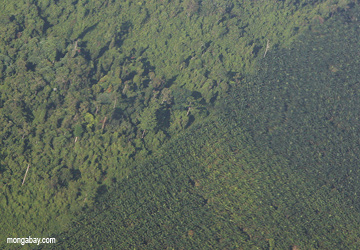Biofuels, food demand may doom tropical forests
Biofuels, food demand may doom tropical forests
mongabay.com
July 15, 2008
Rising demand for fuel, food, and wood products will take a heavy toll on tropical forests, warns a new report released by the Rights and Resources Initiative (RRI).
The study, titled “Seeing People through the Trees, estimates that 515 million hectares of land will be needed by 2030 to meeting growing global demand for food, bioenergy, and wood products. Some 315 million hectares of this expansion will occur at the expense of tropical forests, especially in Southeast Asia and the Amazon.
“Arguably, we are on the verge of a last great global land grab,” said Andy White, Coordinator of RRI and co-author of the report. “Unless steps are taken, traditional forest owners, and the forests themselves, will be the big losers. It will mean more deforestation, more conflict, more carbon emissions, more climate change and less prosperity for everyone.”
The report says that biofuels will be an important driver of forest conversion for agriculture. In Brazil the area of land under cultivation for soy and sugarcane is expected to grow from 28 million hectares (ha) today to 88-128 million ha by 2020. Indonesia’s oil palm estate is expected to grow from 6.5 million ha today to 16.5 to 26 million ha by 2025. In China, biofuel cultivation alone is expected to require an additional 13.3 million ha of land by 2020.

Oil palm plantation and logged-over forest in Borneo. |
A second RRI report, “From Exclusion to Ownership? Challenges and Opportunities in Advancing Forest Tenure Reform“, warns that the transition may be a violent one, since rural land rights are still poorly defined in many developing countries. Only 27 percent of developing country forests are either owned by communities or are public forest designated for use by communities. Only twelve out of the top 30 forest nations put into place policies that strengthen community rights.
“Governments retain a firm grip on the majority of forests,” stated the report. “Industrial claims on forest lands are increasing sharply, for biofuels production, among other reasons.”
The report warns that the proposed Reduce Emissions from Deforestation and Degradation (REDD) mechanism for forest carbon offsets could exacerbate the conflict over land rights in regions where land ownership is poorly defined.
Leading biofuels wreak environmental havoc January 3, 2008
Biofuels made from world’s dominant energy crops — including corn, soy, and oil palm — may have worse environment impacts than conventional fossil fuels, reports a study published in the journal Science. Analyzing recent findings from a Swiss government study on 26 types of transport biofuels, Jorn P. W. Scharlemann and William F. Laurance say that arguments in favor of some large-scale biofuels often fail to fully account for the environmental costs of production, including destruction of forests, emissions of trace greenhouse gases, and air pollution. Fuels derived from “residual products, such as biowaste or recycled cooking oil, as well as ethanol from grass or wood” may offer lower environmental costs, according to the authors.
Tropical forests face huge threat from industrial agriculture December 5, 2007
With forest conversion for large-scale agriculture rapidly emerging as a leading driver of tropical deforestation, a new report from the Woods Hole Research Center (WHRC) suggests the trend is likely to continue with Brazil, the Democratic Republic of the Congo, Indonesia, Peru, and Colombia containing 75 percent of the world’s forested land that is highly suitable for industrial agriculture expansion. Nevertheless the study identifies forests that may be best suited (low population density, unsuitable climate and soils) for “Reduced Emissions from Deforestation and Degradation” (REDD) initiatives which compensate countries for preserving forest lands in exchange for carbon credits.
Biodiesel demand could destroy world’s forests October 4, 2007
Growing demand for biodiesel could drive large-scale forest conversion for energy crops, warns a study published in Conservation Biology. With petroleum supplies expected to peak in the next 5-30 years and growing concern over climate change, biodiesel production may expand by 100-fold by 2050, estimates Lian Pin Koh, a researcher from Princeton University. Koh says that much of this expansion could come at the expense of forests, but the degree of which depends on the feedstocks used. Energy crops like palm oil are significantly more productive than more widely used rapeseed — which currently accounts for 84 percent of biodiesel production — but are more likely to be established in carbon-rich and biodiverse ecosystems like the tropical forests of southeast Asia. As such, the environmental trade-off between feedstocks is complex.














